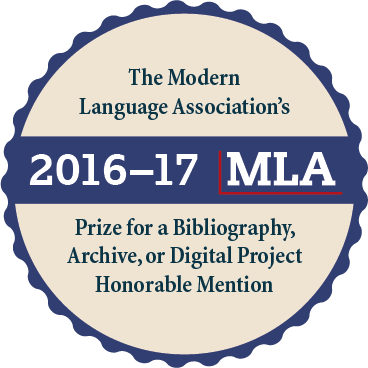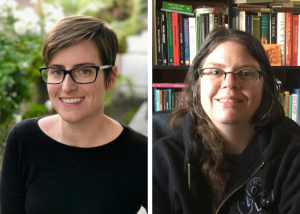One for the books
The MLA awards an honorable mention for the biennial Prize for a Bibliography, Archive, or Digital Project to the Women in Book History Bibliography, the project of PhD recipient Kate Ozment and current PhD student Cait Coker.

By Alix P ’18
Recent Ph.D. recipient Kate Ozment and current Ph.D. student Cait Coker, both with the College of Liberal Arts, developed the Women in Book History Bibliography–a passion project that showcases the important role women have played in book history. The Modern Language Association (MLA) recently awarded their dedicated efforts with an honorable mention for the Prize for a Bibliography, Archive, or Digital Project.
With only one other honorable mention awarded in the prize’s 22-year history (notably received by James L. Harner, also of Texas A&M), this biennial award is given to bibliography projects that display “analytical rigor, meticulous scholarship, intellectual creativity, and subject range and depth,” according to the MLA website.
“They don’t have to give out an additional prize, and we like to think it means we are doing something right,” Coker said. “These prizes also tend to go to really impressive, well-funded projects, and we are still very much establishing ourselves. We’re still kind of in shock.”
The Women in Book History Bibliography is an online platform that allows people to learn about women’s involvement in the history of literature. While studying at Texas A&M, Coker and Ozment found that available scholarship on this topic was severely limited, and decided to create a Google document to share resources with each other.

Kate Ozment (left) and Cait Coker (right)
“At some point, we had a conversation about how if this shared document helped us so much, it could probably help others too,” Ozment said. “Women’s roles in the field of book history are often unknown and under-studied, and we want to increase awareness of these really amazing stories.”
Their simple Google document was a seed that grew into a full bibliographical website that now includes over thirteen hundred relevant sources, as well as thousands of users from around the world. Ozment and Coker wanted to make clear not only the involvement of women in the history of the book, but the significance of their role.
“Too many key books in our field ignore the topic or presence of women, and that’s something we want to change,” Coker said. “It impacts how students are taught, how people think about books, and therefore how we think as a culture about women’s roles in our histories.”
The creation of this project would not have been possible without an endowment provided by the Elizabeth Greenwade Qualls ‘89 Endowed Fellowship through the Department of English, which Ozment received in 2016. This fellowship provided resources for both further research and the website domain.
“Without this endowment, we don’t know if we would have had the time or ability to take our lists and turn them into an accessible platform for others,” Ozment said. “There is a lot of power in making new narratives, and in training teachers to uncover new histories with their own students. It’s slowly changing at our level, as scholars, and we hope that trickle-down effect will happen, too. These sorts of changes are slow but powerful.”
To learn more about the Women in Book History Bibliography, visit here.
